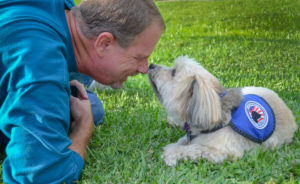As of 2019, there were approximately 200,000 registered emotional support animals. While not everyone has a pet for this purpose, it’s still essential to become a good pet communicator.
This will help you better care for your animals and ensure animal wellness. We’ve put together a brief guide on how to get started.
Let’s take a look at how you can simplify communicating with pets.
Be Observant
Take the time to observe their body language. Look out for signs like physical changes, unusual vocalizations or behavior, and even changes in eating habits.
For example, if your pet is normally very active and starts becoming lethargic, it could be a sign that something is wrong. Catching these issues early on can help you prevent them from escalating.
Understand Animal Needs
Every pet has different needs that can vary depending on their breed, age, diet, and lifestyle.
Take some time to learn about the specific needs of your pet so that you can provide them with the best care possible. The better you understand your pet, the stronger your relationship will become.
Provide Love and Security
Animals need security and love just like humans do. Make sure to give your pet plenty of attention and affection.
Provide a safe environment and make sure they get enough exercise to stay healthy. One of the best ways to do this is by taking your pet for regular walks or playing with them. Depending on the type of pet you have, you can also provide enrichment activities or toys to keep them active.
Talk in a Gentle Tone
Speak to your animals in a calm, soothing voice that won’t frighten them. This will let your pet know that you’re not a threat and that you’re there to take care of them. Although it may seem difficult, avoid using harsh tones or words that might scare them when you’re upset.
This will become easier over time as your relationship grows.
Spend Time Together
Spend quality time with your pet, such as taking walks or playing games together.
This will help you get to know one another better and foster a stronger bond between the two of you. The more time you spend together, the more comfortable your pet will become with you.
Keep in mind that not all pets will bond with you as fast as you anticipate. Some animals require extra time and patience to become comfortable with someone. This is especially true if your pet is a rescue animal.
Use Positive Reinforcement
Offer rewards for good behavior instead of punishing bad behavior. Doing so will help your animal learn quickly and respond positively to commands. A great way to reward your pet is with treats, but make sure to give them in moderation. Otherwise, you may negatively impact their health.
You may also inadvertently give them too much freedom, which could result in poor behavior in the future.
Be Patient
Animals often don’t respond quickly, so it’s important to be patient when communicating with them.
Don’t expect your pet to understand everything right away. Give them time to process what you’ve said and adjust their behavior accordingly.
Patience will go a long way in helping you become a better pet communicator. If you find yourself getting frustrated, take a deep breath and take a moment to regain composure.
Benefits of Animal Communication
When done correctly, pet communication can have lasting benefits for both you and your animal.
This includes a stronger bond between the two of you, fewer behavioral issues, and better overall health and well-being. In addition to this, it also allows you to be more in tune with your pet’s needs and feelings so that you can provide them with the best care possible.
Other benefits include being able to better understand animal behavior and recognizing potential problems before they arise.
With practice, pet communication can also help reduce stress in both you and your animal. This is especially important for those who have emotional support animals.
Relationships like these require a deep connection and understanding, which can be achieved through communication. As a result, the bond between you and your animal can become stronger and last a lifetime.
Getting Started
Working with a professional can help you learn the basics and give you a better insight into how to handle different situations. You can also brush up on your knowledge with books, websites, or other pet-related materials.
With these tips in mind and plenty of practice, you’ll soon be speaking your pet’s language fluently.
When searching for someone to work with, be sure to ask questions about their experience and qualifications.
You’ll easily find the right one for your pet’s needs and get the most out of the experience. Looking through past feedback from clients will allow you to narrow down the best possible options.
Finally, reputable professionals offer specialized animal communication classes that can help you avoid many of the problems you would otherwise encounter. Be sure to keep this in mind moving forward.
Become a Great Pet Communicator
Do you ever wish you could truly understand what your pet is trying to tell you? Well, now you can with Ani’s “Introduction to Animal Communication” Class!
In this class, you will learn how to communicate with your pet on a deeper level and understand their behaviors and needs.
Sign up now and save 20% off the regular enrollment rate, and take the first step in unlocking the secret language of your beloved pet. Ani is excited to help you build an even stronger bond with your furry friend!
Learn more about Ani’s “LIVE 3-HOUR ANIMAL COMMUNICATION CLASS via Zoom”




